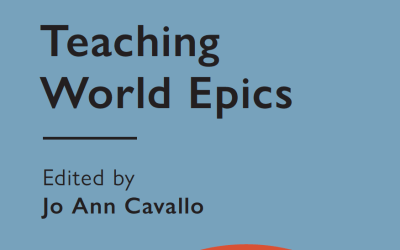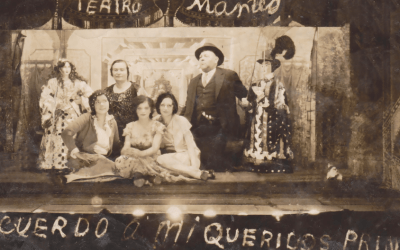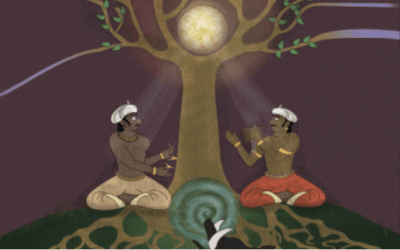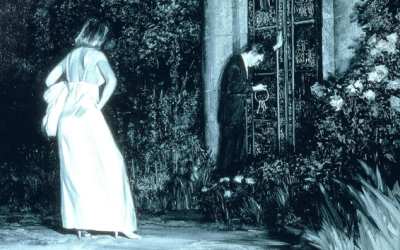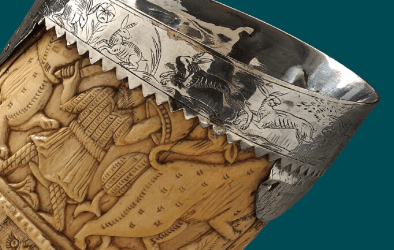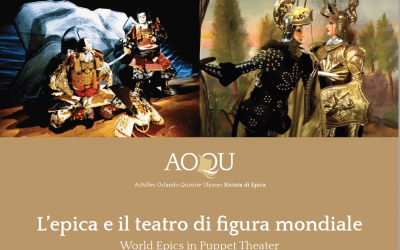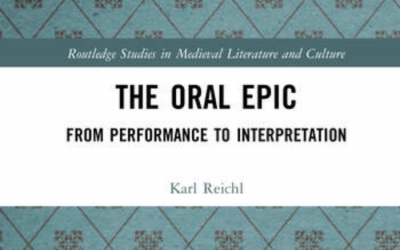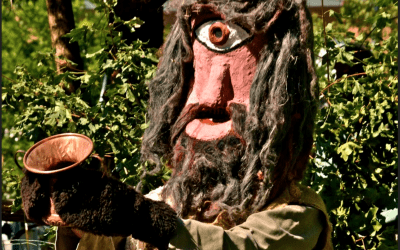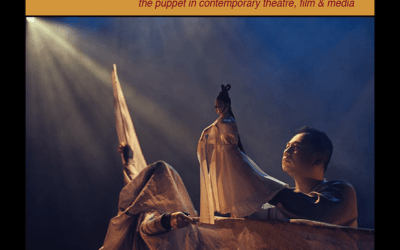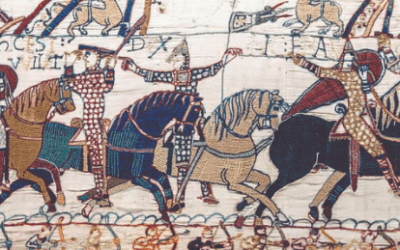Books, Series & Journals
World Epics and Puppet Theater (AOQU 4.2)
This issue of the journal AOQU stems from the project entitled World Epics in Puppet Theater: India, Iran, Japan, Italy, co-sponsored by the Humanities War and Peace Initiative, through the Division of Humanities in the Arts & Sciences, Columbia University, conceived and coordinated by Jo Ann Cavallo of the same institution. Yet the volume extends beyond the four above-named countries to explore epic narratives in oral tradition, primarily puppet theater, in several different regions across Europe, Africa, and Asia. As the contributors make evident, the dramatization of epic stories is both a genuinely local and quintessentially global art form that invites comparative analysis and critical thinking on a number of themes essential to the human condition that remain utterly relevant today.
World Epics and Puppet Theater / L’epica e il teatro di figura mondiale (AOQU 4.2) contains contributions in Italian by Anna Carocci and Alessandro Napoli, in French by Flora Mele, and in English by Yanna Kor, Elisabeth den Otter, Brunhilde Biebuyck, Yassaman Khajehi, Claudia Orenstein, Elyzabeth Oyler, Matthew Isaac Cohen, Kathy Foley, Anurupa Roy, and Paula Richman.
The journal is open access, so both the entire volume and individual chapters can be downloaded. The volume will also be published in paperback format by the Edizioni Pasqualino (Museo internazionale delle Marionette ‘Antonio Pasqualino’) in 2024.
Teaching World Epics
Teaching World Epics offers strategies for teaching epic works from Africa, Europe, Mesoamerica, and East, Central, and South Asia that are available in English translation, including Ludovico Ariosto’s Orlando Furioso, Beowulf, Giulia Bigolina’s Urania, The Book of Dede Korkut, Luis Vaz de Camões’s Os Lusiadas, Charlemagne’s Journey to Jerusalem and Constantinople, Daurel and Beton, David of Sassoun, Egil’s Saga, The Epic of Askia Mohammed, The Epic of Gilgamesh, the epic of Sun-Jata, Alonso de Ercilla y Zúñiga’s La Araucana, Geste Francor, Homer’s Iliad and Odyssey, Kalevala, Kebra Nagast, Kudrun, The Legend of Poṉṉivaḷa Nadu, the Mahabharata, Manas, John Milton’s Paradise Lost, Mwindo, the Nibelungenlied, Poema de mio Cid, Popol Wuj, the Ramayana, the Shahnameh, Sirat Bani Hilal, The Song of Roland, Edmund Spenser’s The Faerie Queene, Statius’s Thebaid, Táin Bó Cúailnge, The Tale of the Heike, Three Kingdoms, Gaspar Pérez de Villagrá’s Historia de la Nueva México, and Virgil’s Aeneid. Published in the Modern Language Association’s Options for Teaching series. Press release. Order form.
Preview:
This preview of the Teaching World Epics volume was recorded for the panel entitled “Teaching World Epics” at the Renaissance Society of America conference, March 10, 2023, San Juan, Puerto Rico.
The Sicilian Puppet Theater of Agrippino Manteo (1884-1947): The Paladins of France in America
By Jo Ann Cavallo.
Anthem World Epic and Romance Series. Anthem Press, 2023.
This study reconstructs the history of the Manteo family marionette theater in New York City, provides translations of eight selected plays and 270 extant summaries, and offers comparative analyses uncovering how Agrippino Manteo’s scripts creatively adapt Italian Renaissance chivalric poems and nineteenth-century prose compilations. e-book hardcover
The book is currently available on Kindle at amazon.com.
Anthem Press Information Sheet.
Book presentation with panelists Barbara Faedda, Jhumpa Lahiri, Anna Lomax Wood, and Konstantina Zanou. Video of event.
Hidden Paradigms: Comparing Epic Themes, Characters, and Plot Structures
By Brenda E. F. Beck. University of Toronto Press 2023.
In Hidden Paradigms, anthropologist Brenda E.F. Beck describes The Legend of Ponnivala, an oral epic from rural South India. Recorded in 1965, this story was sung to a group of village enthusiasts by a respected pair of local bards. This grand legend took more than thirty-eight hours to complete over eighteen nights. Bringing this unique example of Tamil culture to the attention of an international audience, Beck compares this virtually unknown South Indian epic to five other culturally significant works – the Ojibwa Nanabush cycle, the Mahabharata, an Icelandic Saga, the Bible, and the Epic of Gilgamesh – establishing this foundational Tamil story as one that engages with the same universal human struggles and themes present throughout the world. Copiously illustrated, Hidden Paradigms provides a fresh example of the power of comparative thinking, offering a humanistic complement to scientific reasoning.
“Whatever happened to the epic?”
“Whatever happened to the epic?” by Jo Ann Cavallo
Miguel de Cervantes famously claimed to have composed Don Quixote de la Mancha to combat the imaginative hold that books of chivalry had over his contemporaries. Reading the novel for the first time as an undergraduate, however, I had been instinctively drawn to the eponymous hero who decided to transform his own life into a heroic adventure in which he could act out the role of knight errant. What’s more, I could relate to the protagonist’s obsession with chivalric narratives since I was an avid reader myself. When I entered graduate school in 1981, however, where “secondary reading” had taken primacy as “literary theory,” I learned to my dismay that the epic genre had been proclaimed dead.
If “video killed the radio star,” as the song recorded by Bruce Woolley and the Camera Club for the Epic label maintains, who or what killed the epic? Or was it simply a natural consequence of our modern world—with industrialized warfare, the proclamation of democratic principles, and the perceived preference for entertainment reflecting the trials of everyday life? According to Mikhail Bakhtin’s The Dialogic Imagination, recently published in English translation at the time, it was the novel, a many-voiced dialogic genre, that rendered obsolete its “monologic” predecessor.
If truth be told, I didn’t spend much time pondering the question of the genre’s demise since the actual epics that I proceeded to study absorbed all my attention. Besides, the examples that most fascinated me, Matteo Maria Boiardo’s Orlando Innamorato and Ludovico Ariosto’s Orlando Furioso, were highly dialogic according to Bakhtin’s own definition. The Russian theorist had never considered Italian Renaissance epic poetry, I surmised, when formulating his conception of epic as monologic.
Read more at the Anthem Press Blog
Epic Ambitions in Modern Times
Epic Ambitions in Modern Times: From Paradise Lost to the New Millennium. By Robert Crossley. Anthem Press, 2022.
This book explores the pleasures and challenges of the epic imagination, the persistent appeal of epic creation for artists and of epic experience for audiences, and the scope of epic achievements in the past three centuries. Artists working in many genres and media have challenged convention and embraced newness while remaining rooted in the oldest of literary forms. These are artists who, thinking and imagining big, have produced unexpected creations. They appeal to readers fascinated by the creative process, by originality and how it is achieved, and by what lies behind and looms above the often casual and commercial epithet of “epic.”
New Publications on Charlemagne and His Legend
Oltre la mer salee: Proceedings of the 21st International Congress of the Société Rencesvals pour l’étude des épopées romanes, Toronto, 13–17 August 2018. Edited by Dorothea Kullmann and Anthony Fredette. May 2022. Studies and Texts 227; Toronto Studies in Romance Philology 4 • xii, 422 pp. Essays in French, English, Italian, and Spanish. Oltre la mer salee collects revised versions of twenty-eight papers in English, French, Italian, and Spanish originally presented at the 21st International Congress of the Société Rencesvals pour l’étude des épopées romanes, held in August 2018 in Toronto. Specialists in the field of medieval Romance epic reconsider traditional approaches and present novel research perspectives. Their studies are divided among four major themes: family relations, manuscripts, French epic in England, and travel and exchanges.
Boydell and Brewer’s imprint, Bristol Studies in Medieval Cultures, is printing a series of “Charlemagne in…” volumes. For the volumes actually out, see Bristol Studies in Medieval Cultures (Charlemagne in English, German and Dutch, Spanish, Latin traditions); the Italian one should be out next spring, and the Norse and Celtic one sooner. The French volume is still being written.
(with thanks to Leslie Morgan, Loyola University Maryland, for this information)
CFP: journal issue on World Epics in Puppet Theater
AOQU 4.2 (2023). World Epics in Puppet Theater
Until recently, epic narratives remained at the forefront of their respective cultures through folk performance traditions, especially puppetry arts. Although this unique form of creative popular expression (at once genuinely local and quintessentially global) has now been largely supplanted by mass media entertainment, puppeteers can still be found today who bring to life heroes and heroines from centuries-old epic masterpieces. While puppet theater traditions reflect distinct and multifaceted political, social, and literary histories, they nevertheless contain many parallel features that invite comparative analysis and critical thinking. Some contemporary puppeteers, moreover, voice their views on perennial and contemporary issues by refashioning the original stories in order to actively question collective confrontations and challenge conventional societal attitudes.
For its eighth issue (IV, 2, 2023), AOQU invites proposals for a monographic section on epic narratives in puppet theater across time periods, languages, religions, and territories, including theoretical perspectives and comparative analyses.
The issue World Epics in Puppet Theater will be published in late 2023. Proposals of max. 1500 characters should be sent by 15 January 2023 to both aoqu@unimi.it and the guest editor, Jo Ann Cavallo, at jac3@columbia.edu. Notification of acceptance will be given by 31 January 2023. Completed manuscripts should be submitted by 30 April 2023. Essays in Italian, English, French or Spanish are welcome.
See also https://riviste.unimi.it/index.php/aoqu/call-for-paper.
The Oral Epic: From Performance to Interpretation
The Oral Epic: From Performance to Interpretation
by Karl Reichl
Routledge 2022
This book focuses on the performance of oral epics and explores the significance of performance features for the interpretation of epic poetry. The leading question of the book is how the socio-cultural context of performance and the various performance elements contribute to the meaning of oral epics. This is a question which not only concerns epics collected from living oral tradition, but which is also of importance for the understanding of the epics of antiquity and the Middle Ages which originated and flourished in an oral milieu. The book is based on fieldwork in the still vibrant oral traditions of the Turkic peoples of Central Asia and Siberia. The discussion combines fieldwork with theory; it is not limited to Turkic epics but branches out into other oral traditions.
Karl Reichl is Professor Emeritus of the University of Bonn (Institute of English, American and Celtic Studies). He has had visiting professorships at Harvard University, the Hebrew University of Jerusalem, the École Pratique des Hautes Études in Paris, the University of Madison at Wisconsin, and the Karakalpak State University in Nukus. His main research interests lie in medieval oral literature and in contemporary (or near-contemporary) oral epic poetry, especially in the Turkic-speaking areas of Central Asia.
For the Table of Contents and purchasing information, see the Routledge webpage. Eight video and audio examples discussed in the book can be downloaded from this webpage.
Anthem World Epic and Romance
The new Anthem World Epic and Romance series publishes rigorous, innovative scholarly studies dealing with epics and chivalric romances from across the globe, both written and oral, in poetry and prose, as well as adaptations in theater and cinema. The series seeks to foster new comparative and cultural understandings of heroic narratives, focusing on literary and geopolitical context, ranging from antiquity through the medieval and early modern period to contemporary society.
Published in 2021:
Victoria Muñoz, Spanish Romance in the Battle for Global Supremacy: Tudor and Stuart Black Legends.
Published in 2022:
Robert Crossley, Epic Ambitions in Modern Times: From Paradise Lost to the New Millennium.
Published in 2023:
Jo Ann Cavallo, The Sicilian Puppet Theater of Agrippino Manteo (1884-1947): The Paladins of France in America
Aaron Sherraden, Śambūka’s Death Toll: A History of Motives and Motifs in an Evolving Rāmāyaṇa Narrative.
Series Editor
Jo Ann Cavallo – Columbia University, USA
Editorial Board
Catherine Bates – University of Warwick, UK
Brenda E. F. Beck – University of Toronto, Canada
Joel P. Christensen – Brandeis University, USA
Albrecht Classen – University of Arizona, USA
Olga M. Davidson – Boston University, USA
Thomas A. DuBois – University of Wisconsin-Madison, USA
Angelica A. Duran – Purdue University, USA
Ruth Finnegan – Open University, UK
Robert P. Goldman – University of California at Berkeley, USA
Elizabeth Jeffreys – Oxford University, UK
John Wm. Johnson – Indiana University, USA
Adeline Johns-Putra – Monash University, Malaysia
Sharon Kinoshita – University of California at Santa Cruz, USA
Elizabeth Oyler – University of Pittsburgh, USA
Emrah Pelvanoğlu – Yeditepe University, Turkey
Karl Reichl – University of Bonn, Germany
Dwight Reynolds – University of California at Santa Barbara, USA
Paula Richman – Oberlin College, USA
Charles S. Ross – Purdue University, USA
Luke Sunderland – Durham University, UK
Frederick Turner – University of Texas at Dallas, USA
Victoria Turner – University of St Andrews, Scotland
Proposals
Anthem Press welcomes submissions of proposals for challenging and original works from emerging and established scholars that meet the criteria of our series. Titles are published in print and e-book editions and are subject to peer review by recognized authorities in the field. Should you wish to send in a proposal for a monograph (mid-length and full-length), edited collection, handbook or companion, reference or course book, please contact: proposal@anthempress.com.
Puppetry International: The Epic Issue (2021)
Puppetry International: The Epic Issue
Fall and Winter, 2021 Issue #50
contains:
Editorials by Andrew Periale and Dassia Posner
Unbounded in Time: Puppets and Epics by John Bell
Agrippino Manteo and His “Irreplaceable Scripts” by Jo Ann Cavallo
Puppetry in The Ring by Lisa Aimee Sturz
Who is Monkey? by Stephen Kaplin
Amir Hamzah: Epic of Islamization by Kathy Foley
Stewing an Alternative Epic: The Soup of Reincarnation by Chee-Hann Wu
A new epic: Anna Cuticchio’s cunto on Salvatore Carnevale by Anna Carocci
Epic Traditions in Puppet Theater: 4 Mini-Symposia by Jo Ann Cavallo
Tholpavakoothu: the Tradition of Narrating the Ramayana by Rahul Pulavar
Exhibit: Dan Hurlin retrospective by Claudia Orenstein
PIR Review: A Sneak Peak at Our New Journal
Puppetry International is a publication of UNIMA-USA, Inc.
It is published twice a year (fall and spring).
ISSN (Print): 1943-6386 ISSN (Online): 2637-9465
Promoting international friendship and understanding through the art of puppetry.
American Center of the
UNION INTERNATIONALE de la MARIONNETTE
c/o Center for Puppetry Arts 1404 Spring Street, NW
Atlanta, GA 30309 USA 404-873-3089 www.unima-usa.org
AOQU. Achilles Orlando Quixote Ulysses
The Journal AOQU welcomes essays in Italian, English, French or Spanish, exploring the role of the Epic model (as a genre proper or as a register) in different cultures up to the present, in literature and beyond. The Journal, furthermore, hosts monographic issues on specific topics. The published issues are available online.


